- Home
- Alex Hughes
Sharp Page 2
Sharp Read online
Page 2
I gave him a moment to process it as his forehead creased.
“Tell me what happened,” I prompted. “Tell me the truth.”
Like a levee cracking under overwhelming pressure, the words flowed out of him in a long, full rush. Behind me, Bellury was smiling.
* * *
When my precognition decided to work, my rating was 78P, which meant my predictions of the future were accurate three times out of four or better. It didn’t work often, though, and when it did it was nearly always regarding my personal safety.
So when the sense flashed danger at me on the way out of the interview room, I moved. Fast. I threw myself down, on the dirty floor, without any regard for dignity, pulling myself into the closest corner, pencil in hand ready as a weapon.
Two point three seconds later, a man came barreling out of another interview room, literally foaming at the mouth. He was carrying an industrial-weight hole punch, held like an unwieldy club in his hands. He tripped, fell directly into where I would have been standing, and hit his head. Hard. On the hole punch and then the floor with a sickening crack. His head started to bleed.
And on the back of it, I saw the round metallic gleam of an implant. The skin around it red and swollen, small black stitches pulling the inflamed tissue so that it ran long lines of pus.
Suddenly the man started seizing, limbs jerking hard in every direction. I stared at him, helpless from two feet away. You weren’t supposed to touch someone seizing. He suddenly went still, far, far too still. Quarantine. We’d need quarantine.
“EMT!” I screamed and—damn it—tried to find his pulse. “EMT now!” I couldn’t feel a mental signature, even with touch, but with my telepathy that didn’t mean anything. He wasn’t dead yet, I told myself.
I turned him over, frantically rehearsing my CPR training as part of the department job. Was it five breaths? Was it six? Two compressions or three? The hell with it; I angled his head up and gave him that first breath. I’d do the best I could until the EMTs—
I fell back on my butt on the hard concrete floor as Clark pushed me aside. Clark, who hated me and was doing his best to get the other cops to hate me too.
“How can I help?” I asked him.
“Go . . . Away . . . ,” he said in between compressions. “You’ve already done enough.”
I stared at him. Even with his distrust of telepaths, he couldn’t think I’d caused this. “This wasn’t my fault. That’s an illegal Tech implant. There’s any number of viruses his brain could have caught—”
“Get the fuck away from me,” Clark spat, and suddenly the narrow corridor was full of rushing feet. Full of EMTs.
I stood back, in that corner, until I was sure they had it under control. Then I went upstairs and brushed my teeth three times, with antimicrobial toothpaste. There hadn’t been time to get the damn mouth shield, and who knows what that guy was carrying? You had to be stone-cold stupid to get an implant these days, and a black-market one was even worse. If you didn’t get a wetware virus from the Tech itself, you were signing up for whatever bug the three guys before you had had.
I brushed my teeth again, and gargled with heavy-salted vinegar. It tasted nasty—really, really nasty—but it cut infection rates in half.
I spat.
* * *
“Please, come in,” Lieutenant Paulsen said without looking up from her desk. “Close the door.”
I pulled the door closed, suddenly wary, and took a seat in her battered guest chair. The seat squeaked as I sat down. A feeling of oppression filled the room, but I couldn’t tell if it was Mindspace or my own panicky mind. With the increased stress of the morning, I was starting to see floating lines of light go in and out of my vision. I took a deep breath and tried to calm, to slow my heart rate. Whatever was going on with Paulsen, I’d need to be at my best to handle it, not struggling to keep my attention.
Paulsen pushed some papers into a folder and set it aside. Pulled another folder toward her. Then she looked up. I expected her to speak, but she only cleared her throat. For the first time ever, I could see every year of her sixty-mumble age written on her face, wrinkles cutting deep, her warm brown skin ashen.
“Are you okay?” I said.
“I’m fine,” she said firmly, the phrase imbued with all the weight of decades as a cop trained to show no weakness. Then she paused again.
Paulsen was a decisive woman, a strong woman. A cop who got things done and constantly held me to her high standards. If she was pausing, this would be bad.
Had she found out my telepathy wasn’t working? It was better now, healing slowly in dribs and drabs more or less at the pace I was expecting, but I’d been keeping it a secret. Cops didn’t like secrets.
“Am I being fired?” I asked, and tried with everything in me to stay calm.
“No,” she said, then amended: “It’s possible.” She cleared her throat. “DeKalb County and the city of Decatur have decided to cut police funding again. By millions. Every department is being hit, across the board. Not just equipment budgets. Not just training this time. We’re being forced to let people go. And the damn politicians are going after what they call wasteful practices. Things like vacation time, recovery time from injuries, and most of all and especially . . .” She paused here again and met my eyes. “Especially contractors. Unlicensed contractors are at the top of the list of cuts.”
I sat back, the chair squeaking again. I was numb. Wait, this wasn’t about my secret? That almost made it worse.
“How long?” I asked. I liked this job. I needed this job.
“Not yet,” she said firmly. “Not quite yet. We have a couple of months before things go into full effect. I’d suggest—in strong terms—you go out and find yourself a license. A certification. Something on paper, in the next six weeks.”
I took a breath. “Six weeks? Wait, my Guild certification doesn’t count?” That was half a million ROCs in training, more, even if the Guild had gotten far more out of me in labor afterward. Before they kicked me out for the drug problem that had landed me on the streets, years ago.
“It’s suspended, has been for a decade according to the information you gave us.” She put her hand on the folder in front of her, what had to be my file.
“I have the training! I thought you guys liked that I was an independent. There aren’t that many people outside the Guild, much less at my level. Even they say my training’s still good. It’s not like I can’t do the job.” And with the normals hating the Guild and fearing telepaths, well, I’d thought my lack of certification (of affiliation) was a plus. Apparently not.
“I know,” she said, and sighed. “I know. But the com-
missioner’s under pressure to make cuts. A lot of pressure. And politically, well, it doesn’t look good for you. Don’t be an easy target.”
“This isn’t fair.” I tried to reach out, to peek into her head, but all I got was a sense of mourning, and determination. No matter how I tried to push, that was all the information I could get, and even that moved away like sand through my fingers. Paulsen was familiar, which helped, but we were right after lunch, approaching my afternoon cutoff for reliable telepathy, and my heart was beating a hundred miles an hour.
I pulled back and focused on what she was saying in the here and now: “—work in the interview room will be critical. Cherabino’s cases too. Give them a reason to keep you. Give me ammunition.”
I took a breath. “Right before Christmas. You’re telling me I could be laid off right before Christmas.” I felt like I was in free fall, like I was standing at the top of a cliff looking down at my life on the streets again. And to make it over Christmas—Christmas still made me think of my mom before she died. Did we have to add another heartbreak on top of that one?
She paused. “This is the worst-case scenario for everyone. I’m sorry.”
“I know,” I said, and stood. I clenched my hands t
ogether so she wouldn’t see them shaking. So I wouldn’t be tempted to lash out. So I wouldn’t burn whatever bridges I had left. But I wanted to. The adrenaline was coursing through my system all too hard, and I wanted to lash out.
Three years clean, and none of it mattered in that moment. I wanted my drug, I wanted to fall off the earth and run away. But I couldn’t. I wouldn’t. I’d come too far, I’d built too much to give up now. No matter how much I wanted to.
So instead of being stupid, I did what any sane Narcotics Anonymous member did—I called my sponsor. And then I went outside to the smoking porch and I chain-smoked six cigarettes in a row while outside the awning it rained, a nasty hard rain that suited my mood perfectly.
And if Mindspace got jumpy, going in and out like a badly tuned radio, I ignored it and tried to get my heart to stop leaping out of my chest.
I needed this job. They’d hired me back after I’d fallen off the wagon in front of them. And if I couldn’t handle money as a result, well, that was proof enough I was untrustworthy. Who else in their right mind was going to hire me now?
I had to keep this job. Whatever it took, whatever I had to pay—I’d pay in blood, if I had to. I couldn’t fall back down that cliff to the streets. I just didn’t have it in me, not a second time.
CHAPTER 2
On the way out of the bathroom, I felt Cherabino’s mind bobbing down the hall in this general direction. I hardened my heart, expecting another near miss in the hallway.
But she kept walking in my direction, like she was looking for me. Her new lackey Michael Hwang was with her.
Homicide detective Isabella Cherabino was beautiful as hell, with dark hair, piercing eyes, large breasts, a mind that wouldn’t stop, and a black belt in something Asian and deadly. She was prone to migraines, she liked her coffee with a liquid creamer, half of one of those blue not-sugar packets, and a little water. She’d give her right arm for her job. We’d been working on and off together for years, but six weeks ago she’d had her tongue in my mouth in one of the hottest kisses I’d ever experienced. After the Link and the serial killer case, well, I’d been an ass. Briefly. And now she was avoiding me.
It was my fault we were Linked. My fault, and the fault of my feelings for her. I’d used her as an anchor to the real world during investigations just too often, leaned too hard on her while dropping into Mindspace, spent too much time warming myself in the edges of her strong and steady mind. I found her, well, calming. For all she bitched and complained. I found her beautiful. So the edges of our minds had gotten a little fuzzy, a little sticky, and the beginnings of a Link had formed by accident.
Guild ethics said I couldn’t keep a Link, no matter how light and accidental, to myself. But I had. And the information had come out at the worst possible time, in the middle of a serial killer case where the killer was targeting her because of me. Worse, I’d had to presume on that Link, make it deeper and stronger and more permanent, to save her life. To save mine. And it couldn’t be undone. It would fade over time, slowly, and there was nothing to do to speed it up, no matter how much it bothered her.
In the beginning, for the first few weeks after I’d burned out my telepathy, the Link had been all I had left. All I could feel of the world outside me, no matter how much I pushed. And while the rest of Mindspace disappeared as my brain healed, disappeared completely until I felt like I was stumbling around in the dark, the Link was still there. Our brains were connected in Mindspace in a way no one fully understood, like two particles in quantum entanglement. The state of one affected the other, no matter what you did to them, and only time would loosen the holds between them. If she was angry, my mood turned angry, and if she slept, I got overwhelmingly tired. I could listen to her emotions, to her thoughts, unless she specifically stood in my way with the technique I’d taught her to shield. Distance helped that insulation shielding, as the noise of the universe added up in the distance between us, and so, after a few weeks—and a fight—she’d started keeping her distance.
The one thing she’d ever asked of me was to keep my hands and my mind to myself. I understood. Since her husband had died six years ago, she was terrified of anyone getting too close. I understood. I did. The longer this went on, the worse it got for her. And it was my fault the Link had settled in, my fault despite everything.
But I’d been paying for the Link for weeks. Weeks. And I’d saved her life, and it didn’t matter. She’d gotten herself a new lackey, and was running every chance she’d get. It was starting to grate.
I wasn’t going to take it personally, damn it. I wasn’t.
“Hi, Michael,” I said pointedly.
“Hello.” Michael was a slight Asian guy, mid-twenties, and today his normally cheerful demeanor was starting to wilt around the edges. I wondered if it was me or the caseload; Homicide wasn’t exactly the most cheerful place to be, and working full-time under Cherabino had to be tough. She was a workaholic, and had been stressed lately—which meant she was working harder. Still, he got to follow her around, got to see her forehead wrinkle when she got an idea, got to be there for all the good stuff.
Cherabino, hanging back, finally got even with me.
“I need your help,” she said, no transition. Her I could read without effort unless I was specifically trying not to, like a wire connecting our brains. No interference, no noise in the way. No matter how tired I was, unless she or I blocked—and sometimes even then—I could read her. Right now she was feeling self-conscious, picking up on me listening to her thoughts. She blocked—hard. A flash of light passed over my field of vision as the difference in mental pressure set my damn brain off again.
“How can I help?” I asked.
Michael looked back and forth between us.
“Housewife turned up dead at the dinner table in Avondale Estates. I’d like you to look at the scene.”
She’d been avoiding me for weeks. I had to know. “Why this case?” And why now? I’d been trying to avoid crime scenes for weeks while my mind healed, and when all else failed I went early in the mornings when the telepathy worked better. It was well after noon already.
“Why not?” Cherabino said. She was hiding something, something I could pull from her through the Link if I wanted. But I left it alone; I was hiding things too.
“I’d love to see you work,” Michael said. “I’ve never worked with a telepath before.”
Okay, now I hated him. He was far too cheerful, and far too there. “You realize I’m a Level Eight telepath? Aren’t you scared I’ll read your secrets?”
“I don’t have many secrets,” was his immediate response.
“Look, people,” Cherabino put in. “They’re waiting for us at the crime scene. Are you going to help or not?”
“Tell me why,” I said, trying to buy more time. Maybe I could pick a fight and get out of having to go see the scene. “Tell me why.”
Her shoulders tensed. “It’s an olive branch, okay?”
I was silent. She knew the telepathy wasn’t working.
“I owe Freeman a favor. And he wants to go on vacation next week. My caseload’s full already. I was hoping you’d give me a lead to get this one done quickly.”
Agreeing to look at a scene when I was in this state was pathetic and stupid. Doing it in the afternoon was worse, risky as hell. But the truth was, when it came to Cherabino, well, I’d do anything for her. Anything.
I sighed. “Let me get an umbrella.”
* * *
One tense car ride over, with Cherabino blocking heavily against my mind, we turned into Avondale Estates. Less than a handful of miles from the department, the small house sat on a small lot, in the middle of ancient twisted trees. The neighborhood was cramped, with small streets and close houses full of old Southern porches, tall facades, and tiny strips of barely tended yards. Like the others on the street, this house was far deeper than it was wide. Two s
tories with a basement, original brick and fresh paint, it had doubtlessly been remodeled a dozen times. The quiet street, full of trees, looked like an oasis in the middle of the bustling city, an oasis of calm and old-style Southern charm.
Well, except for the two police cars with flashing lights and the crime scene van, the latter of which was currently settling down onto street level, its anti-grav engines whining under the strain.
Cherabino parked the car, and, taking my courage in hand, I got out.
Like a two-by-four to the head, Mindspace hit me with a firestorm of emotion, a force like a hurricane. I fell back against the car, struggling.
I finally got the blocks up. This had to be a hot spot, a place where Mindspace grabbed onto emotion and stewed on it for a long time. Most places Mindspace forgot things, slowly, as the memory of them faded over time.
But here the residue was strong, too strong. It screamed from the house with intense emotion I could feel even through my shields—screamed of pain and twisted love, layer upon layer of abuse and pain. The pain was wavering, but I could feel it; no chance I’d duck out of this nastiness. I didn’t know how much detail I’d get, but the Mindspace and its tortured emotional baggage would push itself into my brain whether I liked it or not. I would be able to read the scene.
“Beautiful home,” Michael said, admiring the wide wraparound porch, the pretty painted flowers.
“No.” I straightened. “No, it’s not.”
Cherabino gave me a funny look but declined to comment. Probably she felt the edge of this through the Link; I was shielding as much as I could, but this was intense. Michael was obviously mind-deaf, it seemed; he was perfectly at ease, while Mindspace all around him screamed at beatings, nasty barbed words . . . and worse. I didn’t want to go into this house.
“Are you coming?” Cherabino asked flatly.
“Yeah.” I swallowed my discomfort, that lingering sense of self-preservation, and followed Cherabino up the old porch stairs. They, like the rest of the house, had a bright fresh yellow coat of paint. The front door was beveled glass, with the green tinge of the extraordinarily bulletproof alloys. We were only a few blocks from a bad area of town, after all. But that glass must have cost a thousand ROCs—a thousand Re-Oriented Currency units or more—to get in a decorative pattern.

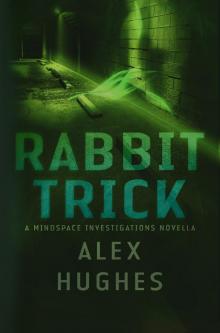 Rabbit Trick: A Mindspace Investigations Short Story
Rabbit Trick: A Mindspace Investigations Short Story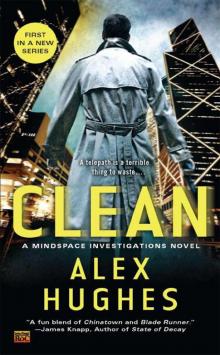 Clean: A Mindspace Investigations Novel
Clean: A Mindspace Investigations Novel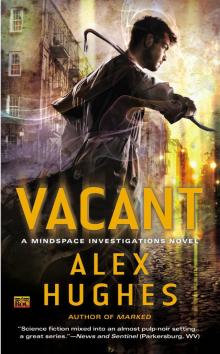 Vacant
Vacant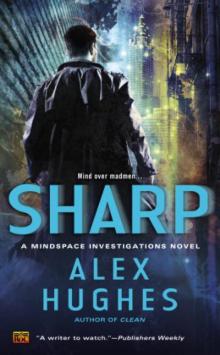 Sharp: A Mindspace Investigations Novel
Sharp: A Mindspace Investigations Novel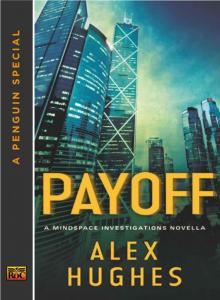 Payoff
Payoff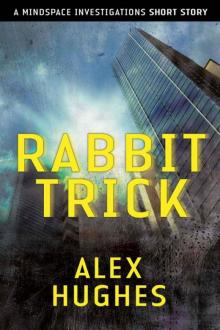 Rabbit Trick: A Mindspace Investigations Novella
Rabbit Trick: A Mindspace Investigations Novella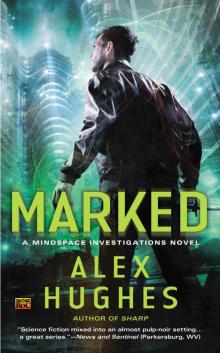 Marked
Marked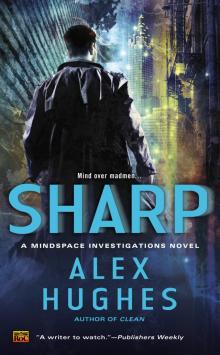 Sharp
Sharp